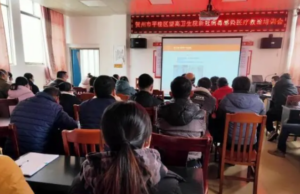
Xinjiang CDC issues tips for prevention and control of epidemics in agricultural and pastoral areas
As the Spring Festival approaches, the risk of spreading the new crown epidemic increases with the increase in aggregated activities. How can farmers and herdsmen in general take the initiative to cooperate in the prevention and control of the epidemic and maintain the health of individuals and their friends and relatives? The reporter interviewed Wang Qiguo, deputy director of the Center for Disease Control and Prevention Emergency Response and Plague Prevention and Control Institute of the autonomous region.
“At present, the prevalent strains of Omicron in China are mainly BA.5.2 and BF.7, whose pathogenicity is significantly reduced compared with the original strain and Delta strain. Clinical manifestations are mainly fever, cough and malaise, but individual patients still develop pneumonia, especially the elderly with underlying diseases, and it is still necessary to take appropriate preventive and control measures.” Wang Qiguo said the main areas include eight.
During the holiday season try to less string, less bunching, less gathering, reduce family gatherings, especially families with elderly people. Red and white celebrations as simple as possible, to avoid a big gesture. Advocate New Year’s greetings by phone, WeChat and other forms of greetings. When going to crowded places such as temples, lantern fairs, bazaars and chess rooms, make sure to wear a mask and stay away from people with fever or cough symptoms. Strengthen personal protection during the journey of people returning home, strengthen self-health monitoring when they arrive home, and advocate holding off returning home during infections.
Enhance physical fitness and immunity. Healthy behavior is an important guarantee to enhance physical fitness and improve physical resistance. Maintain healthy behaviors in life, live regularly, exercise, get enough sleep, drink more water, quit smoking and limit alcohol, eat more vegetables and fruits, and maintain a good state of mind.
Maintain good respiratory hygiene habits. When coughing or sneezing, cover your mouth and nose with a tissue, elbow, etc. Wash your hands after coughing or sneezing, avoid touching your eyes, nose or mouth as much as possible, and change your mask regularly.
Wash hands regularly and necessary hand hygiene. Washing hands regularly is an important measure to prevent respiratory infections. Promote frequent hand washing, especially after coughing or sneezing, before eating or after contact with a contaminated environment, and if necessary, use disinfectant gel, wet wipes or portable hand spray for hand hygiene.
Keep the environment clean and ventilated. Keep the home environment clean and well ventilated. Clean the living room frequently and ensure 10-15 minutes of open window ventilation every day.
Correctly understand the disease and treat the epidemic rationally. Keep abreast of the requirements related to the prevention and control of the epidemic, maintain a good state of mind, do not panic, do not be anxious, do not believe in rumors, do not spread rumors, and do not blindly use medication.
Use medication scientifically and always keep some symptomatic drugs at home, but do not stock up on them to avoid failure or waste. Pay attention to your health status at all times, and go to the nearest township health center or village health office for medical consultation when symptoms of infection appear. During recovery at home, use scientific medication and treat the symptoms, and seek medical attention if symptoms continue to worsen.
We will take the initiative to care for each other under the premise of good personal protection, provide assistance to the folks in need such as buying daily necessities and emergency medical treatment, and share the surplus treatment drugs, masks and disinfection supplies to the folks in urgent need.


Average Rating